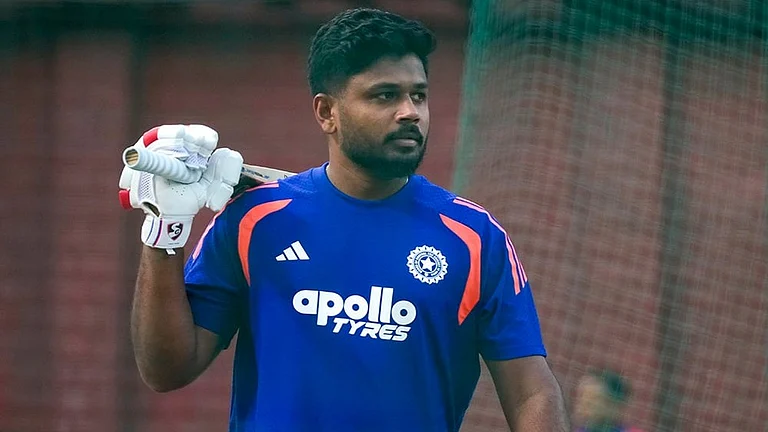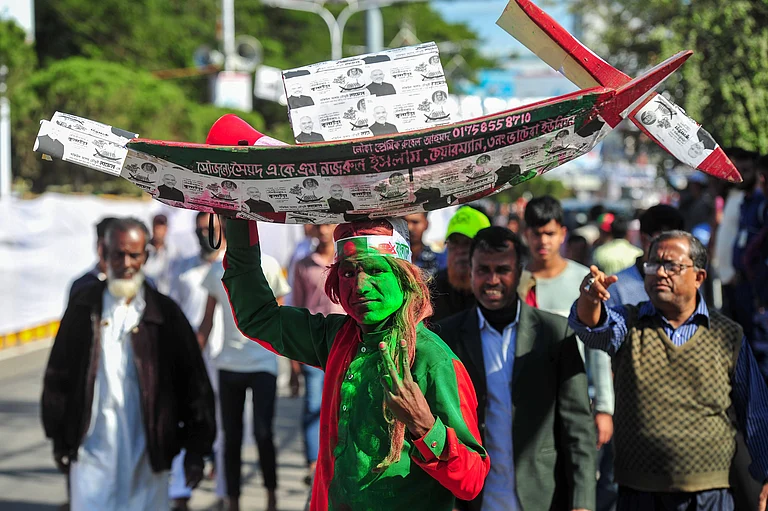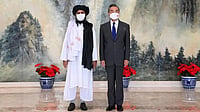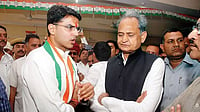All the 11 convicts in the case of gangrape of Bilkis Bano and murder of her seven family members walked out of Gujarat's Godhra sub-jail on Monday.
“We were not aware of the release of the convicts, nobody told us. We came to know about it through local media reports,” said Yakub Rasul, Bano’s husband, in an interview with Outlook.
The convicts were serving life imprisonment for raping pregnant Bano and killing seven members of her family, including her three-year-old daughter. The convicts walked out free after the Bharatiya Janata Party (BJP) government in Gujarat released them under its remission policy.
“We are scared for our lives. We don’t know what will happen to us now,” adds Rasul.
Back in 2002, the local police officers repeatedly refused to register Bano’s case, citing lack of evidence and threatening her with legal action if she persisted. However, in December 2003, Bano approached the National Human Rights Commission (NHRC) and filed a plea before the Supreme Court. The apex court later directed the Central Bureau of Investigation (CBI) to investigate the case.
After the CBI arrested all the suspects in 2004, Bano raised apprehension of the possibility of evidence tampering and potential harm to witnesses and the case was transferred from Ahmedabad in Gujarat to Mumbai in Maharashtra.
In January 2008, a special CBI court in Mumbai sentenced the accused to life imprisonment on the charges of gang rape and murder. The Bombay high court maintained the conviction of the accused in 2017. In 2019, the Supreme Court ordered the Gujarat government to provide Bano with a compensation of Rs 50 lakh, a job, and a house.
While pleading that he had been in jail for more than 15 years, Radhesham Shah, one of the convicts, had approached the Supreme court in April 2022 and appealed for premature release. Section 433A of the Code of Criminal Procedure (CrPC) allows the government to consider setting a life convict free if the latter has served a minimum sentence of 14 years.
The Supreme Court held that since the crime was committed in Gujarat, the Gujarat government was the appropriate authority to examine Shah’s plea while maintaining that the Gujarat government should consider the plea under state remission policy of 1992.
Following the apex court’s directions, the Gujarat government formed a committee that later recommended that the sentences of all 11 convicts in the case be remitted.
The Saga of Remission
The 11 convicts —Radheshyam shah, Jaswant Chaturbhai Nai, Keshubhai Vadaniya, Bakabhai Vadaniya, Rajibhai Soni, Rameshbhai Chauhan, Shaileshbhai Bhatt, Bipin Chandra Joshi, Govindbhai Nai, Mitesh Bhatt, Pradip Modhiya— walked out of Godhra sub-jail on August 15.
Seemingly, the decision of releasing the rape and murder convicts flies in the face of the Union Home Ministry’s recent directives that observe “special remission is not to be granted” to those facing a sentence of life imprisonment and rape.
“As part of the celebrations (Azadi Ka Amrit Mahotsav), it is proposed to give special remission to certain categories of prisoners and release them in three phases – 15th August 2022, 26th January 2023 and again on 15th August 2023,” said a home ministry notification that was put out on June 10, 2022. It reiterated that the special remission is not to be granted to a longer list of 12 categories of convicts, and the excluded categories also comprise death row convicts or cases where death has been commuted to life, those sentenced for life, and those who have perpetrated rape.
As per Gujarat’s remission policy of 1992, to be eligible to seek the remission of sentence, two factors are important — firstly the convict must have finished serving the minimum of 14 years in jail and secondly the convict must have exhibited improvement in his behaviour inside the penitentiary. However, Shobha Gupta, an advocate who has represented Bilkis Bano, tells Outlook that the release of the convicts is shocking on many grounds.
She says, “Although 1992 policy maintains that the completion of serving the 14 years of sentence is mandatory for seeking remission, it does not imply that the mere period of serving the sentence, or improved behaviour becomes the basis of releasing the convicts.
“The 14 years served in the prison only make you eligible for seeking the remission. It does not mean that you are going to be set free. To assess whether the convict should be set free or not, other factors are necessarily to be taken into the consideration — gravity of crime, victim’s safety, and the impact convict’s freedom on the social order.”
It appears, says Gupta, that the committee has overlooked all these factors and signed their release based on the fact that they have served a minimum of 14 years in prison.
“The committee has seemingly treated the criteria of eligibility for seeking remission as the criteria for setting the convicts free,” says Gupta.
Gupta tells Outlook that, as per law, the committee ought to have assessed the gravity of the perpetrated crime as to how heinous it is to kill 14 people and gangrape a pregnant woman. Another factor, she adds, was to consider whether the victim would be safe after the convicts are released, given the fact that they live in the same village.
“But, on the contrary, all these factors seem to have been overlooked by the committee, and the hasty release of the convicts not only sends a wrong precedent but also puts Bano’s safety at stake,” says Gupta.
She adds, “Remission is not a matter of right as the apex court has repeatedly said. It is a reward granted to a convict passing specific requirements. The committee has overtly misused the criteria for eligibility to remission as a licence for setting the convicts free.”
'Lost 18 years of our life'
Bilkis Bano released a statement on August 17 saying “the trauma of the past 20 years washed over me again when I heard that the 11 convicted men who devastated my family and my life and took from me my 3-year-old daughter, had walked free”.
She further said, “No one enquired about my safety and well-being, before taking such a big and unjust decision. Give me back my right to live without fear and in peace. Please ensure that my family and I are kept safe.”
Kavita Krishnan, a Delhi-based human rights activist and the secretary of All India Progressive Women’s Association (AIPWA), scathingly attacked the decision, saying that it is shocking that the Gujarat government chose to release the convicts.
She told Outlook, “It is worth pondering as to what compelled the state to release them [convicts] when there are hundreds of others languishing in jails who have committed less heinous crimes, who are equally —if not more— eligible for remission. After they were released, people of the same ideological fraternity as the ruling party garlanded them and celebrated and gave them sweets. What message does this give?”
Krishnan was referring to the incident when the released convicts were greeted with garlands at the Vishwa Hindu Parishad (VHP) office. VHP is a Hindu right-wing organisation that was founded in 1964 by Rashtriya Swayamsevak Sangh leaders MS Golwalkar and SS Apte.
According to several media reports, a jail advisory committee that was set up by the Gujarat government comprised two MLAs from the ruling BJP — CK Raulji and Sumanben Chauhan. Reportedly, the committee also included three members— Pavan Soni, Sardarsinh Baria Patel, and Vinitaben Lele— whom the official notification called “social workers”. However, all of them are members of the BJP.
Rasul, Bano’s husband, told Outlook, “We fought for 18 long years just to seek a normal life. The decision of Gujarat government brought us back to the point where we had started—the state of fear and uncertainty. We had just begun living a normal life, and now we don’t know what the future has for us.”


























